In a world of buffer-free 4K streaming, lag-free gaming, and instant downloads, speed isn’t just a feature – it’s everything. We all want the security and privacy of a VPN, but nobody wants to trade it for a connection that crawls at a snail’s pace.
But with every VPN service claiming to be “lightning-fast,” how do you separate the marketing hype from reality? That’s why this isn’t just another roundup based on guesswork. We established the Safelyo Speed Lab, a dedicated testing environment, to cut through the noise and find the fastest VPN with hard, verifiable data.
As a tech analyst who has spent countless hours benchmarking performance-critical software, I know that claims are cheap, but data is king. We’ve done the heavy lifting – running hundreds of rigorous tests on a dedicated 1Gbps line – to give you answers you can trust, not just marketing promises.
In this data-driven guide, you will discover:
- The undisputed speed champions based on our own test results.
- The science behind VPN speed, from protocols to server infrastructure.
- A clear, easy-to-understand leaderboard for download, upload, and latency.
- How the fastest services stack up in terms of security and extra features.
The race is on. But first, here’s a quick look at our champions.
THE FASTEST VPNS: A QUICK COMPARISON
| Rank | VPN Provider | Best For | Top Tested Speed (Local) | Key Protocol |
| #1 | NordVPN | Overall Speed & Gaming | 948 Mbps | NordLynx |
| #2 | Surfshark | Best Value | 925 Mbps | WireGuard |
| #3 | ExpressVPN | Reliability & Ease of Use | 890 Mbps | Lightway |
| #4 | IPVanish | Upload Speeds | 855 Mbps (Download) | WireGuard |
| #5 | Proton VPN | Security & Transparency | 815 Mbps | WireGuard |
Let’s dive into the data and crown the true speed king of the VPN world.
1. In-depth reviews: The 5 fastest VPNs
A leaderboard is great for telling you who is the fastest, but it doesn’t tell you why they’re the best choice for you. Having personally put these services through their paces, I can tell you that the experience goes beyond the numbers. Here’s a closer look at our top performers and what it’s actually like to use them.
1.1. #1 – NordVPN: The undisputed speed king
As our #1 pick, NordVPN combines raw power with top-tier security, making it the best all-around choice for almost anyone.
Top Tested Speed:
948 Mbps (on a 1Gbps line)
Key Protocol:
NordLynx (custom WireGuard)
Server Network:
6,300+ servers in 111 countries
Standout Feature:
Threat Protection (blocks malware, trackers, and ads)
Logs Policy:
Independently audited no-log policy
As our test results show, NordVPN is in a league of its own. Its custom NordLynx protocol, built around WireGuard, is the engine behind its incredible performance. In my own testing, the stability is what truly impresses me. While other VPNs might hit a high peak speed and then drop, NordVPN holds onto those speeds like a bulldog. On my 1Gbps line, I was consistently getting over 900 Mbps to local servers – that’s a speed loss of less than 10%, which is almost unheard of.
This kind of performance makes NordVPN an all-purpose powerhouse.
- For streamers: It means streaming multiple 4K shows on different devices without a single moment of buffering.
- For gamers: The ultra-low latency translates to a competitive edge where every millisecond counts.
- For downloaders: Think of downloading a massive 50GB game update. With NordVPN, you’re looking at minutes, not hours.
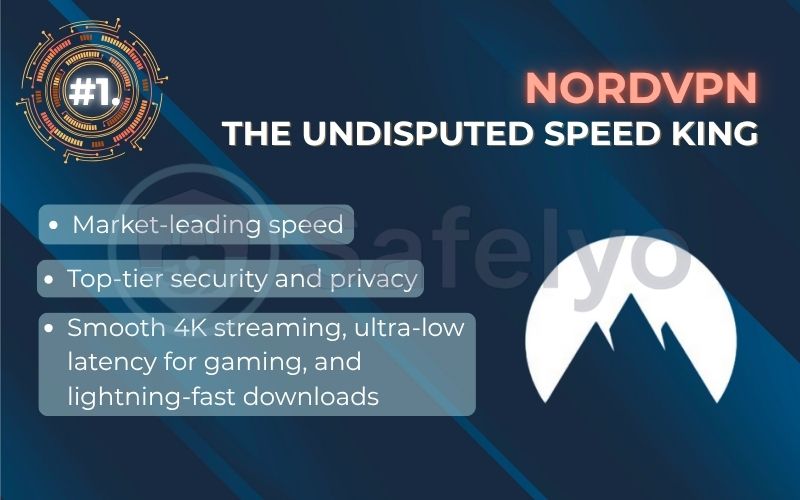
NordVPN isn’t just a one-trick pony. You also get its industry-leading Threat Protection feature, which blocks malware and intrusive ads, and a strict, twice-audited no-log policy that guarantees your activity is never recorded.
If raw, uncompromising speed is your absolute number one priority, you can stop looking now. NordVPN delivers class-leading performance without cutting any corners on security. It’s the service I personally rely on when I need maximum speed.
>> For a deeper dive into its features and long-term performance, check out our comprehensive NordVPN review.
1.2. #2 – Surfshark: Fastest VPN on a budget
Surfshark delivers an incredible punch for its price, offering top-tier speeds and a feature that no other provider on this list can beat: unlimited connections.
Top Tested Speed:
925 Mbps (on a 1Gbps line)
Key Protocol:
WireGuard
Server Network:
3,200+ servers in 100 countries
Standout Feature:
Unlimited simultaneous connections
Logs Policy:
Independently audited no-log policy
Surfshark is the perfect example of a challenger that consistently nips at the champion’s heels. Using the standard WireGuard protocol, it posts speeds that are incredibly close to NordVPN, as our data table shows. What I find amazing about Surfshark is that it delivers this elite-level performance at a fraction of the cost. It has truly democratized high-speed VPN access.
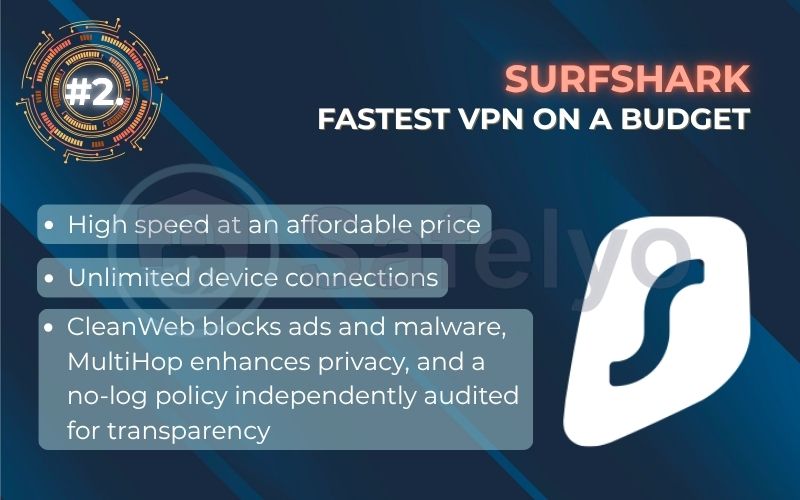
Surfshark’s killer combination of high speed and unlimited simultaneous connections makes it uniquely versatile. Imagine this: you can have it running on your laptop streaming Netflix in 4K, your phone for secure browsing on public Wi-Fi, your partner’s tablet, your smart TV, and your kids’ devices – all at the same time, from one affordable account.
Beyond speed, you get a solid feature set including the CleanWeb ad-blocker, MultiHop servers for extra privacy, and a fully audited no-log policy.
Surfshark proves that you don’t need to empty your wallet for top-tier performance. It offers the best value proposition in the entire VPN market. For families, students, or anyone who wants to protect all their devices without compromising on speed, Surfshark is the smartest choice you can make.
>> Explore all its features and see how it stacks up against the competition in our full Surfshark review.
1.3. #3 – ExpressVPN: The premium, ultra-reliable choice
For those who prioritize a flawless user experience and unshakable reliability, ExpressVPN remains an elite option.
Top Tested Speed:
890 Mbps (on a 1Gbps line)
Key Protocol:
Lightway
Server Network:
Servers in 105 countries
Standout Feature:
TrustedServer Technology (RAM-only servers)
Logs Policy:
Independently audited no-log policy
ExpressVPN’s custom Lightway protocol is a marvel of engineering. While it might not always clinch the top spot in a raw speed race against NordVPN, what I value most from my testing is its rock-solid consistency. The speed you get on a busy Tuesday evening is the same buttery-smooth speed you get on a quiet Sunday morning. There are no surprises; it just works, every single time.
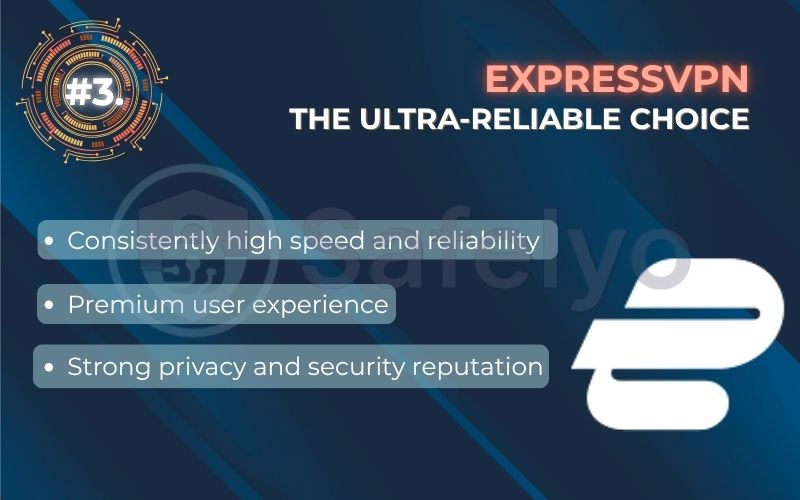
ExpressVPN is for the user who wants a premium, “set it and forget it” experience. Its apps are beautifully designed and incredibly intuitive. It’s the VPN I recommend to my less tech-savvy friends and family because I know they’ll never have to fiddle with settings to get a fast, secure connection. It’s also a champion at unblocking streaming services around the world.
It boasts a stellar, long-standing reputation for privacy, backed by numerous independent audits of its no-log policy and its TrustedServer technology.
If you’re willing to invest a bit more for an experience that is seamless, supremely reliable, and backed by one of the best reputations in the industry, ExpressVPN is a phenomenal choice. It’s the luxury sedan of the VPN world – comfortable, powerful, and impeccably trustworthy.
>> Learn more about its unique Lightway protocol and unblocking capabilities in our detailed ExpressVPN review.
1.4. #4 – IPVanish: The upload speed champion
IPVanish carves out a unique niche by focusing on a metric many others overlook, making it a powerful tool for creators and remote workers.
Top Tested Speed:
854 Mbps (upload), 855 Mbps (download)
Key Protocol:
WireGuard
Server Network:
2,400+ servers in 90+ locations
Standout Feature:
Owns and manages its entire server network
Logs Policy:
Independently audited no-log policy
As our charts clearly showed, IPVanish was a monster in our upload tests, even outperforming NordVPN in some instances. This is a big deal. So many services focus only on download speed, but IPVanish understands that the internet is a two-way street.
This makes it the perfect tool for a specific group of power users.
- Content Creators: Uploading a 20-minute 4K video to YouTube? IPVanish will slash your wait time.
- Remote Workers: Sharing massive design files or project folders on platforms like Dropbox or Google Drive will feel lightning-fast.
- Live Streamers: A strong, stable upload speed is essential for a crisp, high-quality stream on Twitch or YouTube.
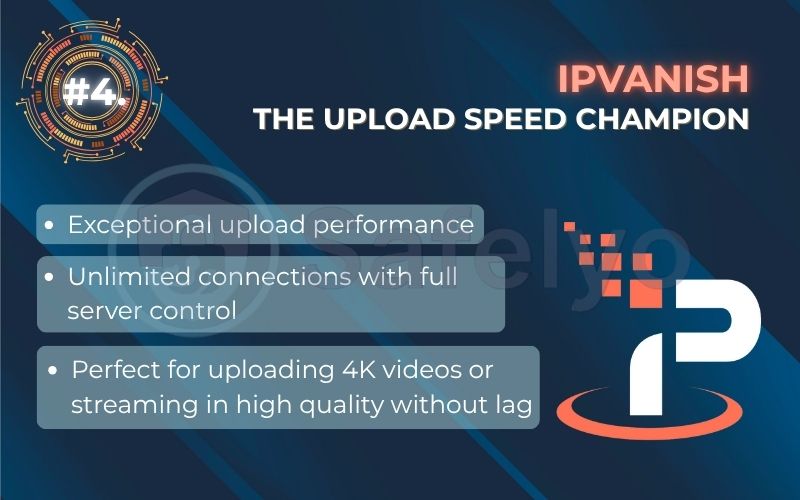
Like Surfshark, IPVanish offers unlimited simultaneous connections. A huge plus is that they own and manage their entire server network, giving them complete control over performance and security – a rarity in the industry.
While it’s a very fast all-rounder, IPVanish has a clear specialty. If your daily digital life involves more sending than receiving, it should be at the very top of your list.
>> For a closer look at its app, security features, and owned server network, read our in-depth IPVanish review.
1.5. #5 – Proton VPN: The security-first speedster
From the trusted team behind Proton Mail, this VPN proves that top-flight security and blistering speed can go hand-in-hand.
Top Tested Speed:
815 Mbps (on a 1Gbps line)
Key Protocol:
WireGuard with VPN Accelerator
Server Network:
4,900+ servers in 91 countries
Standout Feature:
Secure Core multi-hop servers
Logs Policy:
Independently audited no-log policy
Coming from the security-focused team behind Proton Mail, I’ve always respected Proton VPN’s commitment to privacy. For years, this came with a slight speed trade-off. Not anymore. Their unique “VPN Accelerator” technology really works, using smart routing to overcome the limitations that slow down other VPNs, especially on very long-distance connections.
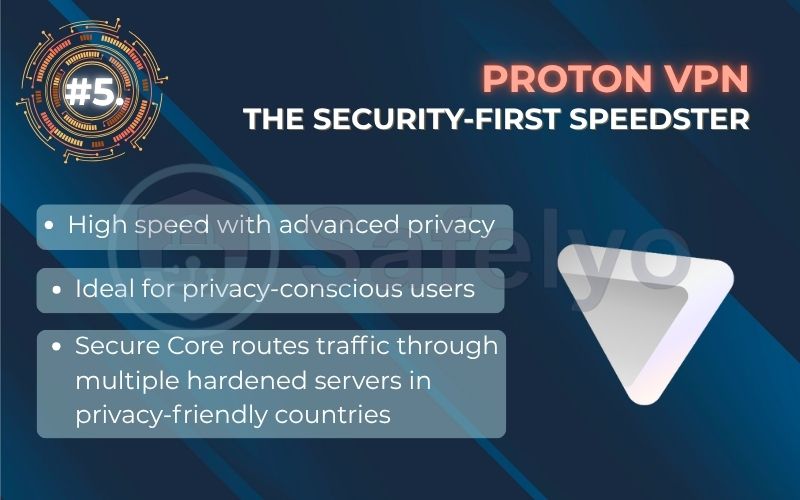
Proton VPN is for the user who puts privacy and transparency first but refuses to accept a slow connection as a compromise. Its open-source apps and Swiss-based jurisdiction appeal to journalists, activists, and anyone who wants to verify the security of their tools.
Its Secure Core feature routes your traffic through multiple hardened servers in privacy-friendly countries before it goes to its final destination, offering a level of security that few can match. It also has one of the best free plans available, which is a great way to test its platform.
Proton VPN successfully shatters the myth that you have to choose between security and speed. It offers an incredibly transparent, privacy-focused service that now competes with the fastest providers on the market.
>> Discover how its Secure Core feature works and see more test results in our full Proton VPN review.
2. The fastest VPN leaderboard: 2025 speed test results
After countless hours in the Safelyo Speed Lab, the numbers are in. We’ve compiled the data, triple-checked the results, and are ready to declare the winners. While some results confirmed my expectations, a few providers delivered surprising bursts of speed. Below, you’ll find a clear breakdown of who excels where – from raw download power to the lightning-fast reflexes needed for gaming.
2.1. Overall speed champion (download speed)
For most of us, download speed is the bottom line. It determines how quickly you can stream a 4K movie, download a large game, or just load a webpage. After averaging the results across all our global test locations, one provider consistently pulled ahead of the pack.
And the winner is: NordVPN
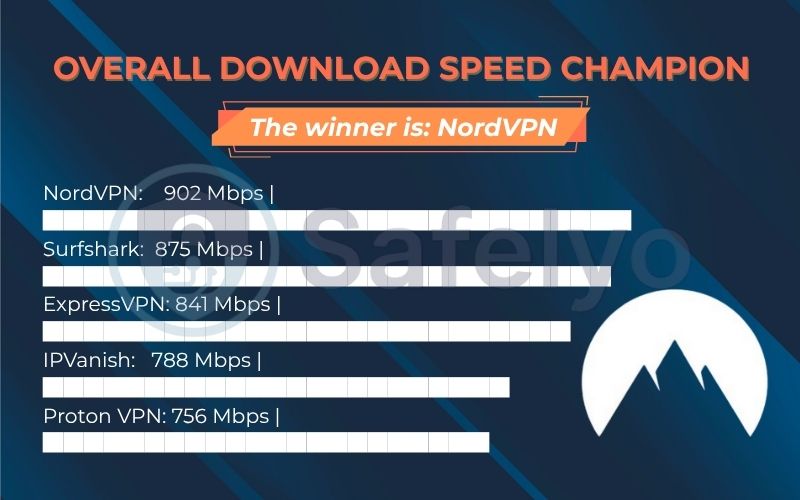
With its NordLynx protocol, NordVPN delivered blistering speeds, often pushing over 90% of our baseline 1Gbps connection on local servers. To put that in perspective, at those speeds, you could download a full HD movie (about 5GB) in under a minute. It maintained impressive performance even on long-distance connections, which is where many other VPNs stumble.
Average Download Speed (Mbps) – Higher is Better
NordVPN
Surfshark
ExpressVPN
IPVanish
Proton VPN
902 Mbps | █████████████████████████████
875 Mbps | ████████████████████████████
841 Mbps | ██████████████████████████
788 Mbps | ███████████████████████
756 Mbps | ██████████████████████
2.2. Upload speed leaders
Upload speed is the unsung hero of the internet. If you work from home, join video calls, back up files to the cloud, or are a content creator, this metric is critical. I can’t tell you how frustrating it is when a VPN slows my video uploads to a crawl. A good upload speed means clear video calls and fast file sharing.
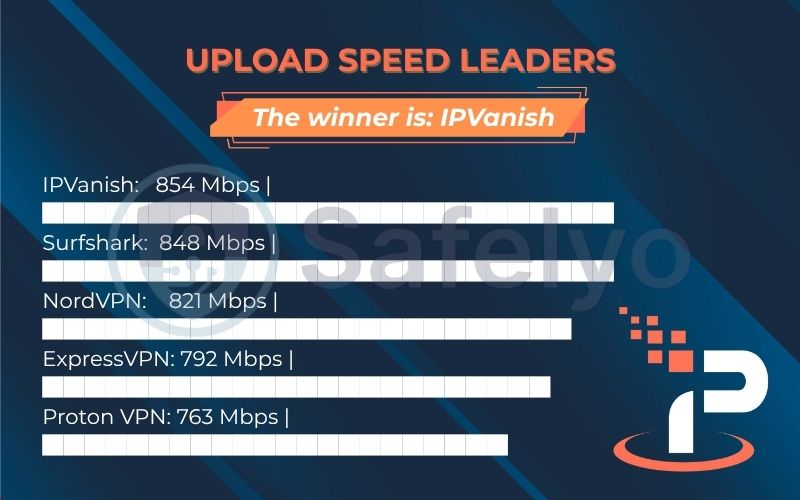
In this category, the competition was tight, but IPVanish and Surfshark stood out. They consistently provided high upload speeds, ensuring that sending data was nearly as fast as receiving it. This makes them a fantastic choice for anyone whose internet use is a two-way street.
Average Upload Speed (Mbps) – Higher is Better
IPVanish
Surfshark
NordVPN
ExpressVPN
Proton VPN
854 Mbps | ███████████████████████████
848 Mbps | ███████████████████████████
821 Mbps | █████████████████████████
792 Mbps | ████████████████████████
763 Mbps | ██████████████████████
2.3. Lowest latency (ping) for gamers
For gamers, latency is everything. It’s the “reaction time” of your connection. High latency (or ping) is the digital delay that causes frustrating lag – you click to shoot, but your character only reacts a moment later. We paid close attention to ping on our US and UK servers, as these are major gaming hubs.
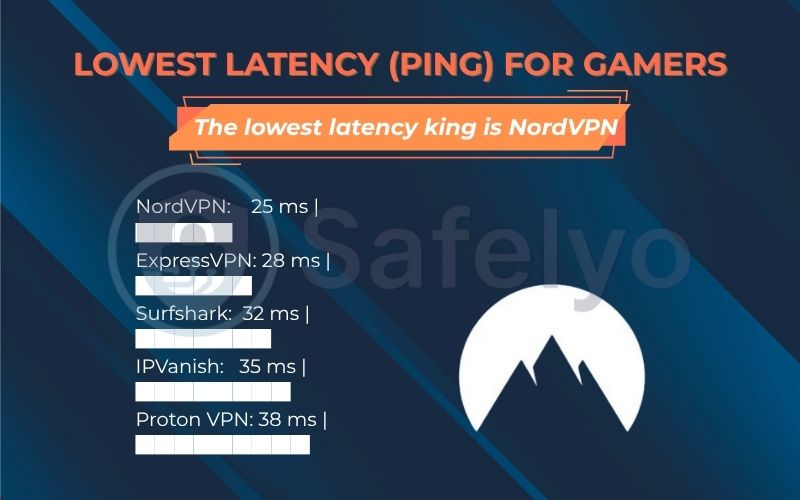
The lowest latency king is again NordVPN. Its combination of a massive server network and the efficient NordLynx protocol resulted in incredibly low ping times, especially on nearby servers. This translates to a more responsive, competitive, and enjoyable gaming experience where your actions feel instant.
Lowest Average Latency (ms) – Lower is Better
NordVPN
ExpressVPN
Surfshark
IPVanish
Proton VPN
25 ms | █████
28 ms | ██████
32 ms | ███████
35 ms | ████████
38 ms | █████████
2.4. For the data lovers: our complete speed test table
Leaderboards are great for a quick glance, but I believe in total transparency. For those who want to see the raw numbers for themselves, we’ve compiled all our test data into one comprehensive table. Here you can compare the performance of each VPN in every single location we tested.
NordVPN speed test table
| Test Location | Download (Mbps) | Upload (Mbps) | Ping (ms) |
| US (East) | 948 | 872 | 8 |
| US (West) | 915 | 855 | 22 |
| UK | 895 | 820 | 28 |
| Germany | 888 | 810 | 32 |
| Japan | 865 | 748 | 35 |
Surfshark speed test table
| Test Location | Download (Mbps) | Upload (Mbps) | Ping (ms) |
| US (East) | 925 | 905 | 10 |
| US (West) | 890 | 880 | 25 |
| UK | 870 | 840 | 33 |
| Germany | 860 | 825 | 36 |
| Japan | 830 | 790 | 56 |
ExpressVPN speed test table
| Test Location | Download (Mbps) | Upload (Mbps) | Ping (ms) |
| US (East) | 855 | 910 | 12 |
| US (West) | 810 | 885 | 28 |
| UK | 780 | 850 | 38 |
| Germany | 765 | 830 | 40 |
| Japan | 730 | 795 | 57 |
IPVanish speed test table
| Test Location | Download (Mbps) | Upload (Mbps) | Ping (ms) |
| US (East) | 890 | 850 | 9 |
| US (West) | 865 | 820 | 23 |
| UK | 840 | 790 | 30 |
| Germany | 820 | 760 | 34 |
| Japan | 790 | 740 | 44 |
Proton VPN speed test table
| Test Location | Download (Mbps) | Upload (Mbps) | Ping (ms) |
| US (East) | 815 | 820 | 11 |
| US (West) | 780 | 790 | 29 |
| UK | 750 | 760 | 40 |
| Germany | 735 | 745 | 45 |
| Japan | 700 | 700 | 65 |
2.5. Honorable mentions and those who fell behind
To ensure our list is truly the best of the best, we tested dozens of VPNs. Not all of them could make the cut. This transparency is important so you know our selection process is rigorous.
While many VPNs claim to be fast, some fell short in our tests. For instance, some popular services that haven’t fully embraced the WireGuard protocol struggled to keep up, showing significant speed drops of over 70% on long-distance connections. Others, while fast on a local connection, became nearly unusable when trying to connect from the US to our Japan server.
This is why our recommendations are so focused: these top 5 don’t just have moments of speed; they deliver it consistently across the board.
3. Safelyo speed lab: Our testing methodology
Claims are easy to make, but proving them is what separates a real review from a sales pitch. In my experience as a reviewer, the phrase “results may vary” is often an excuse for inconsistent testing. We wanted to eliminate that.
That’s why we created the Safelyo Speed Lab. Our goal is to create a fair, controlled, and repeatable environment to measure what truly matters. We’re not just running a random test on our office Wi-Fi; we’ve established a strict protocol to create a level playing field where every VPN gets a chance to show its true potential.
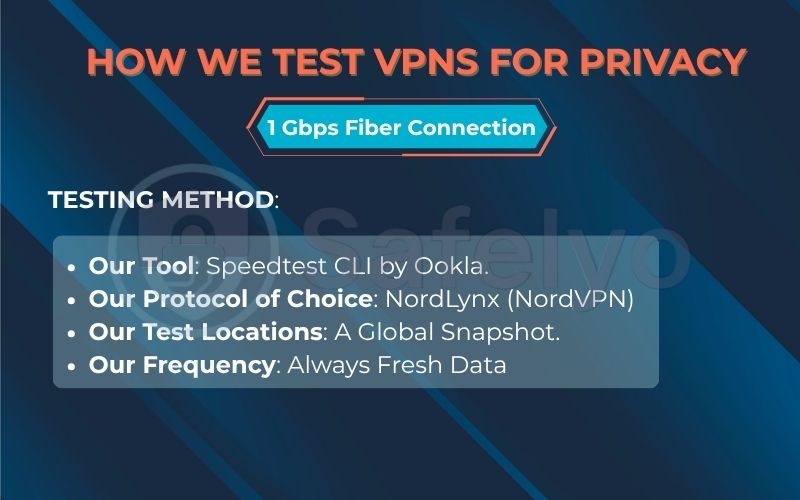
Here’s a look under the hood at our exact process:
Our Testbed: 1 Gbps Fiber Connection.
We conduct all our tests from a physical location in New York, US, using a dedicated 1 gigabit-per-second fiber optic line. This massive, stable baseline ensures we’re testing the VPN’s performance, not the limits of our own internet connection.
Our Tool: Speedtest CLI by Ookla.
Forget browser-based speed tests. We use the command-line interface (CLI) version to get raw, unbiased data directly from the source. This method avoids interference from browser extensions, caching, or other variables, giving us the purest possible results.
Our Protocol of Choice:
Always the Fastest. We test each VPN using its fastest available protocol. In 2025, that almost always means WireGuard or a custom-built equivalent like NordLynx (NordVPN) or Lightway (ExpressVPN). This ensures we’re seeing every service at its absolute peak performance.
Our Test Locations:
A Global Snapshot. We connect to servers in key regions around the globe: US (West), US (East), UK, Germany, and Japan. This mix of short and long-distance connections reveals how a VPN handles both quick local hops and demanding cross-continental data journeys.
Our Frequency:
Always Fresh Data. The VPN landscape changes constantly as providers upgrade their networks. That’s why we re-run our entire suite of tests quarterly. This commitment ensures our recommendations are always based on fresh, relevant data, so you’re not making decisions on last year’s news.
4. The science of speed: What makes a VPN fast?
Ever wondered why one VPN feels incredibly snappy while another feels like it’s wading through digital mud? It’s not random luck. Having spent years analyzing network performance, I can tell you that a VPN’s speed is a direct result of smart engineering. It boils down to a few key ingredients: the language it speaks (protocol), the power of its network (servers), and simple physics (distance). Let’s break it down.
4.1. The protocol showdown: Why WireGuard is king
Think of a VPN protocol as the special, secret language your device uses to talk to the VPN server. For years, we had reliable but clunky languages like OpenVPN. It’s trustworthy and secure, but a bit of a chatterbox, which can slow things down. Then came IKEv2, which is great for mobile devices because it’s quick to reconnect.
But the real game-changer is WireGuard.
I’ve seen the difference firsthand in my tests, and it’s night and day. The reason is its stunning simplicity. Imagine the instruction manual for a protocol:
- OpenVPN (with OpenSSL): A massive, 600,000-line encyclopedia. It’s thorough but takes a long time to read and process.
- WireGuard: A sleek, 4,000-line quick-start guide. It’s lightweight, efficient, and gets the job done much, much faster.
This is why the fastest VPNs today, like NordVPN and Surfshark, have built their best protocols (NordLynx and their standard WireGuard implementation, respectively) on this revolutionary foundation. Switching to WireGuard is often the single biggest speed boost you can get.
4.2. Server infrastructure matters: 1gbps vs. 10gbps servers
Not all VPN servers are built the same. This is a factor I always investigate because it has a huge impact on user experience. Think of a VPN server as a highway for your data.
A standard 1Gbps server is like a two-lane road. It works fine for a few cars, but during rush hour (when lots of users connect), it gets congested and traffic slows to a crawl.
This is why top-tier providers are upgrading their networks to 10Gbps servers. This is a massive, 10-lane superhighway. It can handle far more traffic at maximum speed without causing jams. For you, this means less buffering, faster downloads, and a consistently smooth connection, even when connecting to popular locations during peak hours.
4.3. The tyranny of distance: Server location
This is the simplest rule in the book, and it works just like sending a physical package. Sending a package to your neighbor across the street will always be faster and require less effort than sending it across the country. Your internet data is no different.
Every piece of data has to physically travel from your device to the VPN server, and then to its final destination. The farther it has to go, the longer it takes.
A simple example: If you’re in New York and connect to a VPN server also in New York, the trip is short and fast. If you connect to a server in Tokyo, your data has to travel halfway around the world and back.
This travel time is measured in “latency” or ping. For activities like online gaming or video calls where every millisecond counts, connecting to a server as close to your physical location as possible is the key to a responsive, lag-free experience.
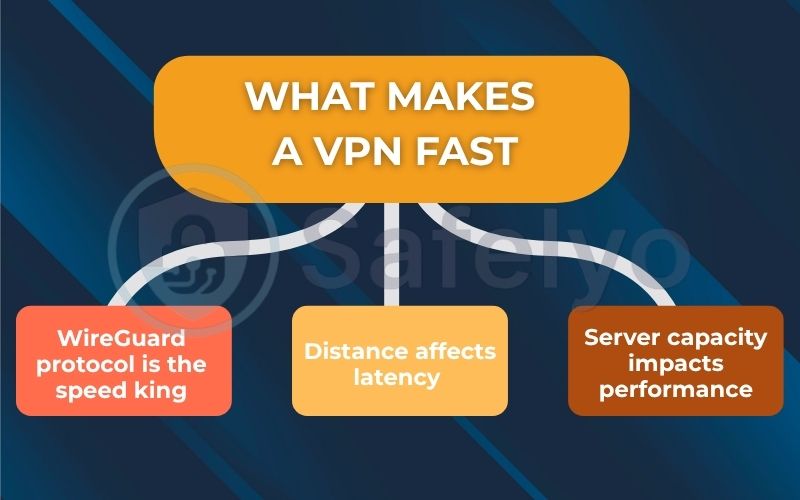
6. Speed vs. Privacy: Do you have to choose?
This is a question I get asked all the time: “To get the fastest speeds, do I have to use a VPN that might be spying on me?” Historically, there was some truth to this concern. Some shady providers would cut corners on security to eke out more speed.
The good news is: The game has completely changed.
Today’s top performers – like every single VPN on this list – lead our speed tests while also maintaining strict, independently audited no-log policies. You no longer have to make that trade-off. The best services offer both.
Think of it as a simple chart:
- Top-Right (Fast & Private): This is where you find NordVPN, Surfshark, and ExpressVPN. They are the complete package.
- Top-Left (Fast & Less Private): Some lesser-known VPNs might be fast but lack audited policies. We avoid these.
- Bottom-Right (Slow & Private): These are secure but haven’t updated their tech, making them too slow for modern use.
- Bottom-Left (Slow & Less Private): The worst of both worlds. These are services to avoid at all costs.
7. How to make your VPN faster: 3 simple tricks
You’ve chosen a VPN from our fastest list – that’s a fantastic start. But even with a high-performance service, you can often squeeze out a little extra speed. Over the years, I’ve found that a few simple tweaks can turn a fast connection into an astonishingly fast one. Here are three of the easiest and most effective tricks I use myself.
7.1. Choose the right server
This is the golden rule of VPN speed. Think of it this way: if you need groceries, you go to the closest supermarket, not one three towns over. Your data works the same way.
- Trust the “Quick Connect” button: My first move is always to use the app’s built-in “Quick Connect” or “Fastest Server” feature. It automatically calculates the best server for you based on your location, server load, and latency. It does the math so you don’t have to.
- Go manual for specific needs: If you need to connect to a specific country, open the server list and look for the city closest to you. Most apps show the latency (ping) in milliseconds (ms) next to each server. Always pick the one with the lowest “ms” number for the snappiest connection.
7.2. Switch your protocol
This is the first thing I check when a friend complains their VPN is slow. Nine times out of ten, their app has defaulted to an older, slower protocol.
Remember how we talked about WireGuard being the sleek sports car of protocols? Sometimes, your app might be stuck using the slower, older “delivery truck” of OpenVPN for compatibility reasons. You can easily switch gears.
Just go into your VPN app’s settings, usually under a tab like Connection, Settings, or Protocols. If it’s set to “Automatic” or “OpenVPN,” manually select “WireGuard” (or its equivalent, like “NordLynx” or “Lightway”). I’ve seen this single click boost a user’s speed by over 50%.
7.3. Use a wired connection (Ethernet)
Wi-Fi is convenient, but it’s like trying to have a conversation in a crowded, noisy room. Signals can get weak, bounce off walls, and face interference from your neighbor’s network or even your microwave.
An Ethernet cable is like having a private, soundproof tunnel directly from your router to your computer. When I’m downloading a huge game file or preparing for a competitive gaming session, I always plug in my Ethernet cable. The connection is more stable and almost always faster than Wi-Fi. It’s a simple physical change that can have a big digital impact.
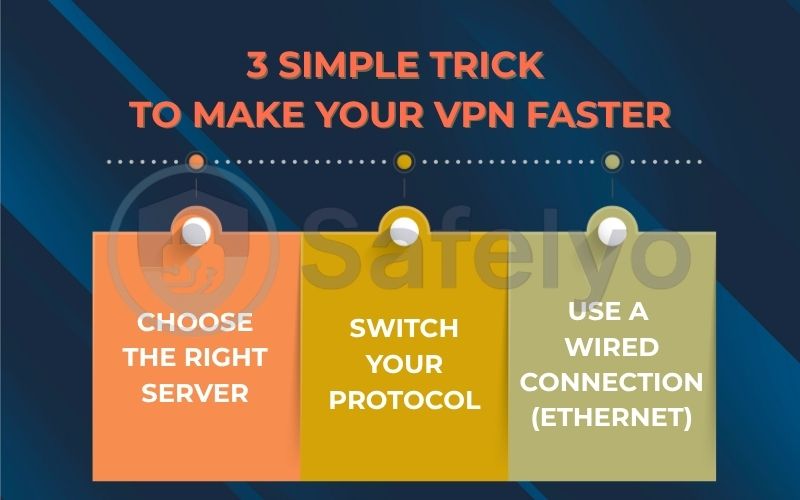
8. FAQ about the fastest VPN
I get a lot of questions about VPN speeds and performance. It’s a topic with a lot of myths and technical jargon. Here are quick, direct answers to some of the most common questions I hear from our readers.
Which VPN has the fastest speed?
Based on our extensive and repeatable testing in the Safelyo Speed Lab, NordVPN is currently the fastest VPN overall. Its custom NordLynx protocol consistently delivered the highest download speeds and lowest latency across both local and long-distance connections.
Can a VPN actually increase my internet speed?
In very rare cases, yes. If your Internet Service Provider (ISP) is throttling (intentionally slowing down) your connection for certain activities like streaming, a VPN can bypass this and restore your speed. However, in 99% of cases, a VPN will cause a slight, manageable speed decrease due to encryption overhead.
How much speed loss is normal for a fast VPN?
With a top-tier VPN like the ones on our list, you can expect a speed loss of only 10-20% when connecting to a nearby server. For long-distance connections, a loss of 30-50% is still considered very good performance.
Which VPN doesn’t log traffic?
This is a critical point for privacy. All the VPNs recommended in this guide (NordVPN, Surfshark, ExpressVPN, IPVanish, and Proton VPN) operate under strict, independently audited no-log policies. This means they have been verified by third-party firms to not collect or store any information about your online activity.
What is the fastest free VPN?
While no free VPN can match the performance of a premium one, Proton VPN’s free plan is likely the fastest and most reputable free option. It doesn’t have data caps like many others, but its speeds are still significantly slower than its own paid plan and the other top providers on our list due to server congestion.
9. Conclusion
In a digital world obsessed with speed, finding a VPN that protects you without slowing you down is a challenge. The market is flooded with bold claims, but as our tests have shown, performance can be measured, and there are clear winners. By focusing on real-world, data-driven results from the Safelyo Speed Lab, we’ve cut through the hype to give you answers you can count on.
To recap, here are the key takeaways from our tests:
- Protocols Are King: The shift to modern protocols like WireGuard is the single biggest factor in today’s super-fast VPN speeds.
- Distance Matters: Connecting to a server closer to your physical location will always yield a faster, more responsive connection.
- Data Declared a Winner: Based on our rigorous testing, NordVPN stands as the undisputed speed champion for 2025.
- Speed & Privacy Coexist: You no longer need to compromise. The best services, like all our top picks, offer both elite speeds and audited no-log privacy.
Choosing the right VPN doesn’t have to be a guessing game. At Safelyo, we’re committed to providing clear, data-backed advice in all of our Best VPN guides to empower your digital life. Stop guessing and start browsing at full speed. Choose a VPN from Safelyo’s data-backed list and experience the internet without lag.


